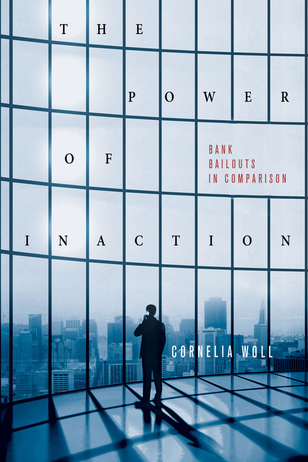The Power of Inaction: Bank Bailouts in Comparison
|
Cornelia Woll
Ithaca, NY: Cornell University Press, 2014 224 pages, ISBN: 978-0-8014-5235-2 Visit Cornell University Press or Amazon to order. Reviews
Press
Announcements
Praise "Cornelia Woll's The Power of Inaction is a brilliant, deeply insightful analysis of the political economy of government responses to banking sector crises. Woll has synthesized myriad arguments across disciplines and narratives among nations to produce a unique approach to one of the central questions of our time."
"Cornelia Woll has produced a richly researched and important analysis of the wave of bank bailouts in advanced democracies prompted by the 2007–2008 Great Recession. In a theoretically sophisticated analysis, Woll asks and addresses the question: What influence did financial industry actors exert on national governments to help them protect their banking and investment institutions? From detailed case studies of the United States, the United Kingdom, Denmark, France, Ireland, and Germany, Woll develops a persuasive argument about how the degree of collective action achieved by a country's financial sector matters fundamentally for the level and content of government intervention and support during a crisis. Not only does the theoretical argument help explain the recent crisis but it provides a framework for understanding state-financial sector relations in general. I highly recommend The Power of Inaction."
|
Description
Bank bailouts in the aftermath of the collapse of Lehman Brothers and the onset of the Great Recession brought into sharp relief the power that the global financial sector holds over national politics, and provoked widespread public outrage. In The Power of Inaction, Cornelia Woll details the varying relationships between financial institutions and national governments by comparing national bank rescue schemes in the United States and Europe. Woll starts with a broad overview of bank bailouts in more than twenty countries. Using extensive interviews conducted with bankers, lawmakers, and other key players, she then examines three pairs of countries where similar outcomes might be expected: the United States and United Kingdom, France and Germany, Ireland and Denmark. She finds, however, substantial variation within these pairs. In some cases the financial sector is intimately involved in the design of bailout packages; elsewhere it chooses to remain at arm’s length. Such differences are often ascribed to one of two conditions: either the state is strong and can impose terms, or the state is weak and corrupted by industry lobbying. Woll presents a third option, where the inaction of the financial sector critically shapes the design of bailout packages in favor of the industry. She demonstrates that financial institutions were most powerful in those settings where they could avoid a joint response and force national policymakers to deal with banks on a piecemeal basis. The power to remain collectively inactive, she argues, has had important consequences for bailout arrangements and ultimately affected how the public and private sectors have shared the cost burden of these massive policy decisions. |

